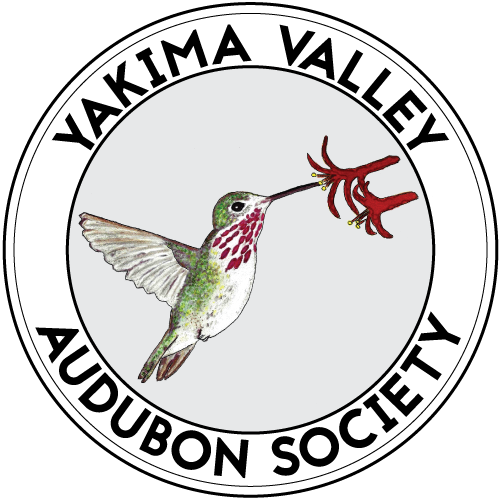Field Trips
Let’s Go Birding!
YVAS field trips are an excellent way to meet other YVAS members, improve your birding skills, and get to know local hotspots and hiking trails. We have field trips appropriate to people of all birding abilities and are led by knowledgable YVAS members. For new birders and families, the Second Saturday Bird Walks are a great way to get started: these walks are always in the Yakima area, short (around 2 hours), over easy trails (1-2 miles) and on Saturday mornings for working people and families.
Come out and give our field trips a try!
Upcoming Field Trips
Saturday, February 14, 9:00-11:00am. Field Trip: Second Saturday Bird Walk, Poppoff Trail. Leaders Sarah Shippen & Gene Miliczky, ses1440@outlook.com. No need to sign up.
Saturday, February 21, all day. Field Trip: McNary Wildlife Refuge. Leader Bill Drenguis, bdrenguis@gmail.com. Contact Bill for details and to sign up.
Saturday, March 7, 8:30-noon. Field Trip: Toppenish National Wildlife Refuge, Leaders: Sarah Shippen & Gene Miliczky, ses1440@outlook.com. Contact Sarah for details and to sign up.
Saturday, March 14, 9:00-11:00am. Field Trip: Second Saturday Bird Walk, Poppoff Trail. Leaders: Sandra Hulteen and Bill Drenguis. No need to sign up in advance.
Field Trip Report – Second Saturday Bird Walk, Saturday, Oct 11, 2025. Helen Jewett Pathway and Poppoff Trail, Union Gap.
On Saturday, October 11, twelve YVAS members joined the Second Saturday Bird Walk at Poppoff Trail, Union Gap. It was a cool morning with broken clouds, but a great day for birding! As soon as we stepped out of our cars at the parking lot, we heard White-crowned Sparrows and a Northern Flicker calling. Walking in towards the first pond we saw California Quail, but it was at the pond where we had our first amazing moment with dozens of Wood Ducks. They were in full breeding plumage, and many were displaying on the pond. We counted 99 at our first stop. Across the pond, perched on a branch, above a group of Wood Duck was a Black-crowned Night Heron. We also heard and saw a Belted Kingfisher, a pair of Green-winged Teal, a Gadwall, and a Great Blue Heron at this first stop. As we watched the pond dozens of Yellow- rumped Warblers were fly-catching in the Russian Olive trees off the trail. We continued through the woods to the second pond where we came upon hundreds of American Wigeons feeding on the pond weed. Mixed in among them were Mallards and a few more Green-winged Teals. Along the trail we saw both a Cooper’s Hawk and a Sharp-shinned Hawk. Finally at Billy’s Pond we came upon a very large group of American Wigeon; also 3 Northern Shovelers, more Green-winged Teal, and another Gadwall. In the brush we saw a Bewick’s Wren, Song Sparrows and Spotted Towhees. In total, we saw 27 species for the day. It was a rewarding first field trip of the new season and a lovely walk in the woods!
Here is the complete bird list: 134 Wood Duck, 3 Northern Shoveler, 1 Gadwall, 220 American Wigeon, 26 Mallard, 8 Green-winged Teal, 20 California Quail, 4 Eurasian Collared-Dove, 2 Black-crowned Night Heron, 2 Great Blue Heron, 1 Sharp-shinned Hawk, 1 Cooper’s Hawk, 2 Red-tailed Hawk, 2 Belted Kingfisher, 1 Downy Woodpecker, 12 Northern Flicker, 1 American Kestrel, 2 Black-capped Chickadee, 1 Bewick’s Wren, 27 American Robin, 3 Dark-eyed Junco, 24 White-crowned Sparrow, 2 Golden-crowned Sparrow, 1 Song Sparrow, 4 Spotted Towhee, 1 Red-winged Blackbird, 48 Yellow-rumped Warbler (Audubon’s).
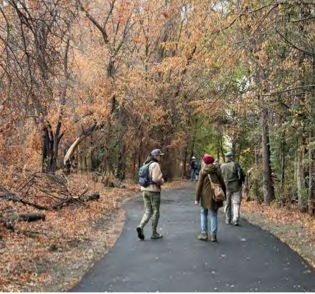
Fall color and good company on Poppoff Trail. Photo: Sarah Shippen
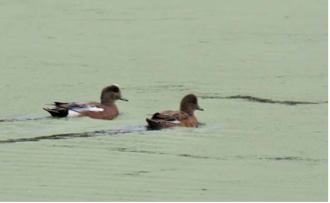
American Wigeon. Photo: Sarah Shippen

Black-headed Grosbeak, photo: Sarah Shippen

Yellow-breasted Chat, photo: Sarah Shippen
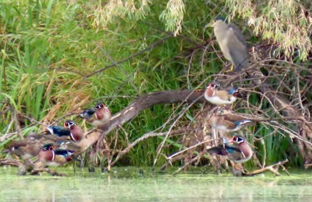
Black-crowned Night Heron and Wood Duck. Photo: Sarah Shippen
Field Trip Information
As trips and leaders are arranged we will add them to the website. Trips may be added with short notice so check often. Trips may be canceled at any time due to bad weather, too few participants, or the lack of a leader. Contact the leader for more information and to reserve a spot.
Field trips are free and are open to anyone. You don’t have to be an Audubon member to participate. Our leaders are club volunteers and are not compensated. If you carpool with somebody, it is common courtesy to compensate the driver for your share of gas and vehicle use. You are also responsible for any park entry fees, camping fees, or motel bills. To enhance the birding experience we need to limit the number of participants on our trips. The number allowed for each trip will be posted. Call or email early to reserve your place on a trip. And, call ASAP if you are not able to make the trip so the leader can offer your spot to someone on the wait list.
Field trips range from a few hours to all day long. Please arrive at the meet up location a bit early. Start time is the time we leave form the meet up location.
What to Bring
Participants need to provide their own binoculars*, food and drink, appropriate footwear and clothing for changing weather, and transportation, unless you find somebody with whom to carpool. Drivers bring your Discover Pass and any other pass you may have.
*A limited number of high quality binoculars are available for use during field trips. Please let the trip leader know in advance if you need binoculars.
Skill Level
We provide a variety of trips that accommodate many birding skill levels. Birders of all levels are welcome on all trips. However, please bear in mind that some beginners may get frustrated or bored on trips designed for advanced birders, where much of the birding is done by ear and the pace is very fast. Some advanced birders might find the trips geared toward beginning birders too basic and slow-paced. The skill level for each trip will be posted.
Families, Children and Dogs
Dogs are disruptive to the birding experience. Therefore, we do not allow any dogs on our trips. While we very much want families to participate, very young children are not appropriate for our field trips. When in doubt about the appropriateness of bringing your child, ask the leader before the trip so you can make plans for child care. Children under 18 years of age must be accompanied by a parent or adult.
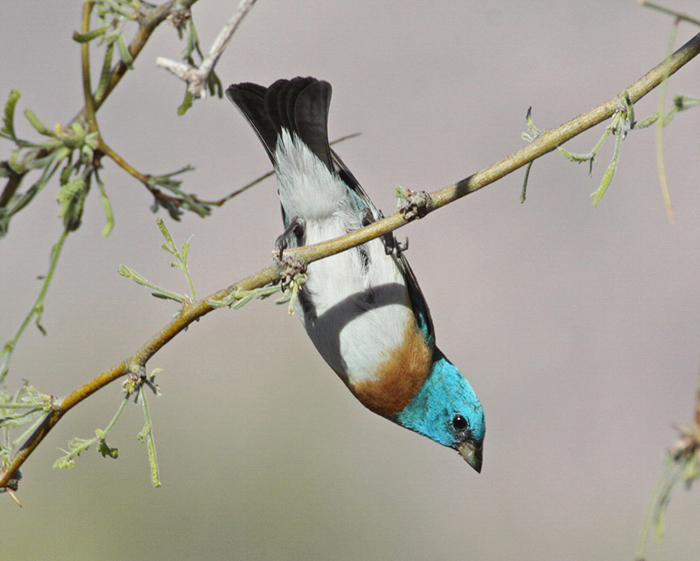
Lazui Bunting, photo: Jacque Brown
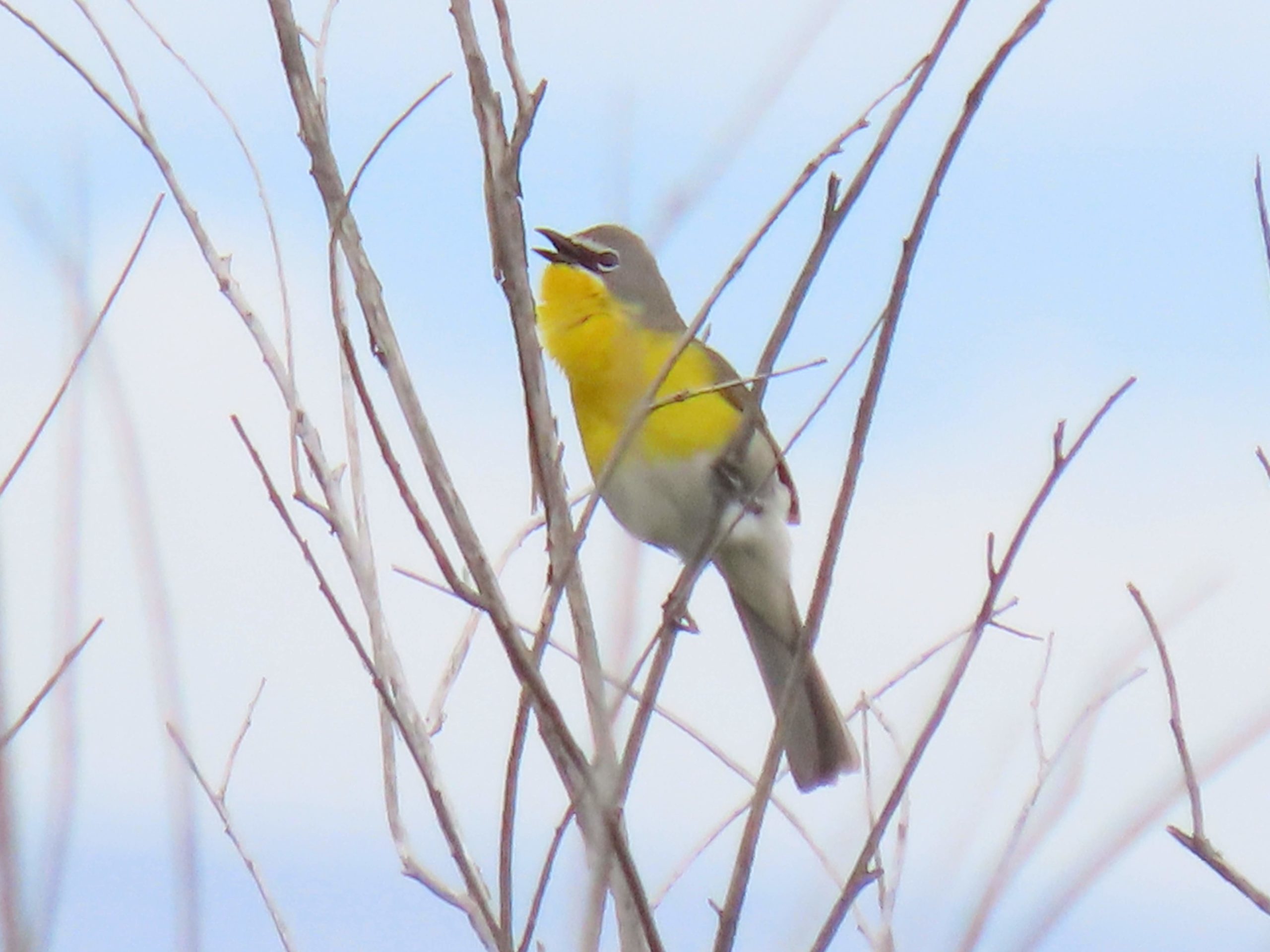
Nashville Warbler, photo: Karen Zook
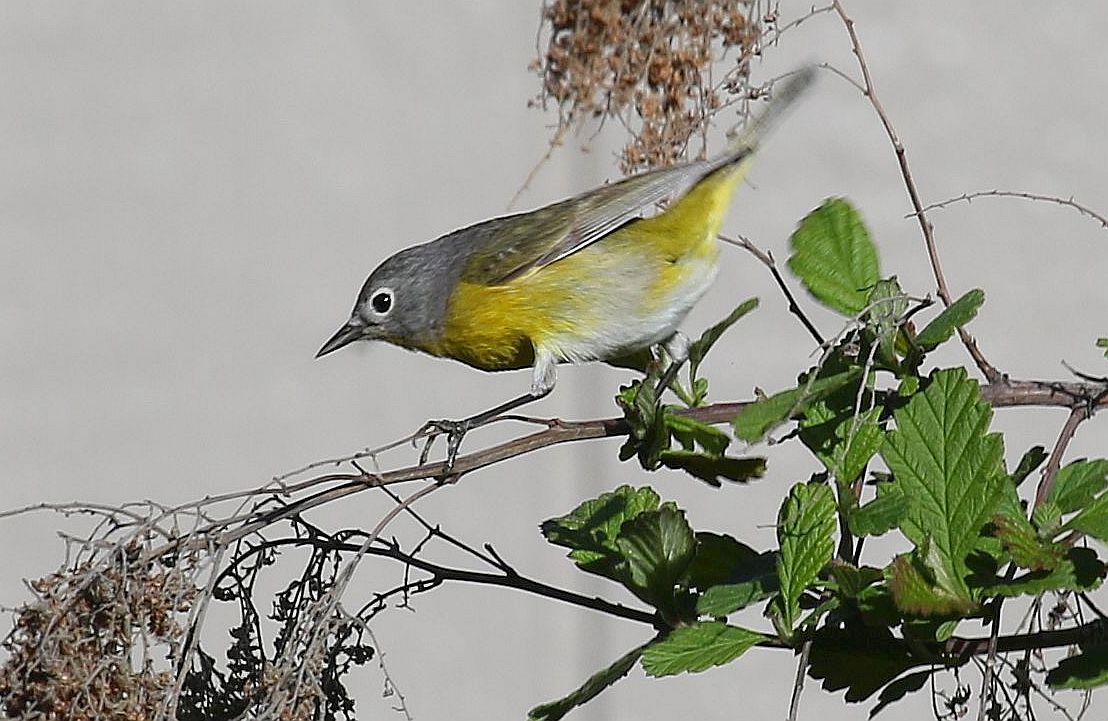
Yellow-breasted Chat, photo: Sarah Shippen
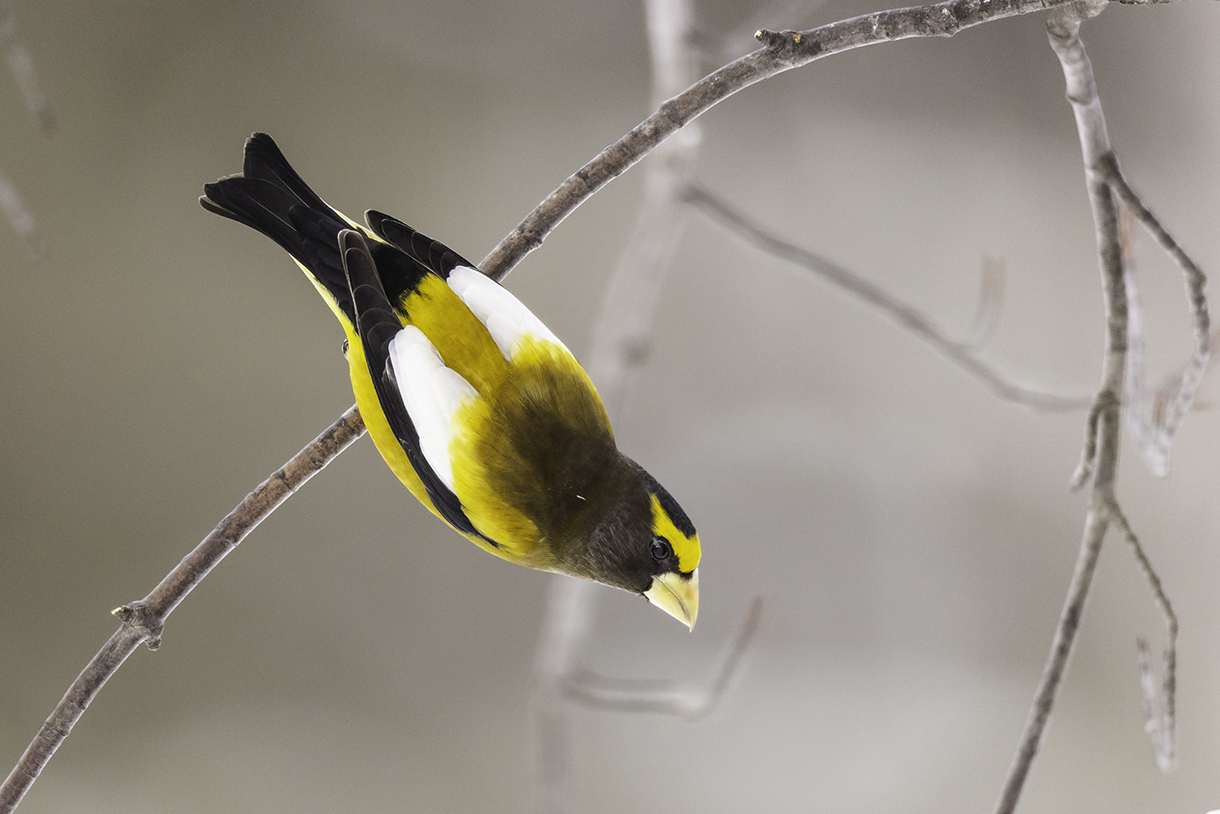
Evening Grosbeak, photo: Joshua Pelta Heller
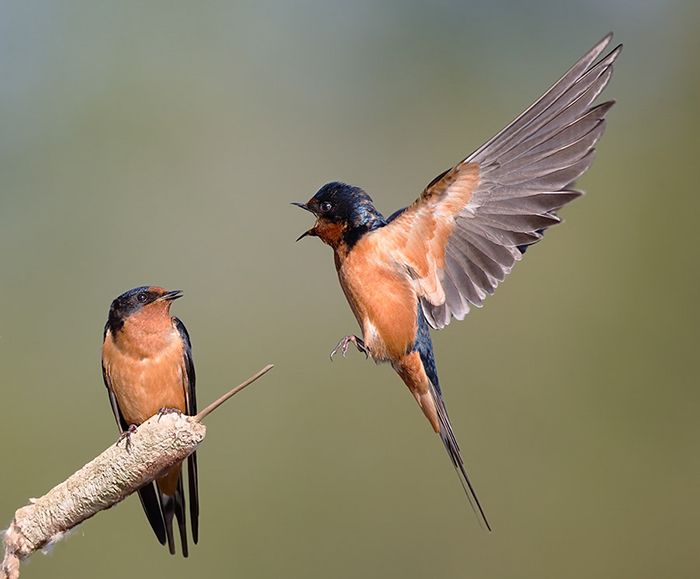
Barn Swallow, photo: Tim Kuhn
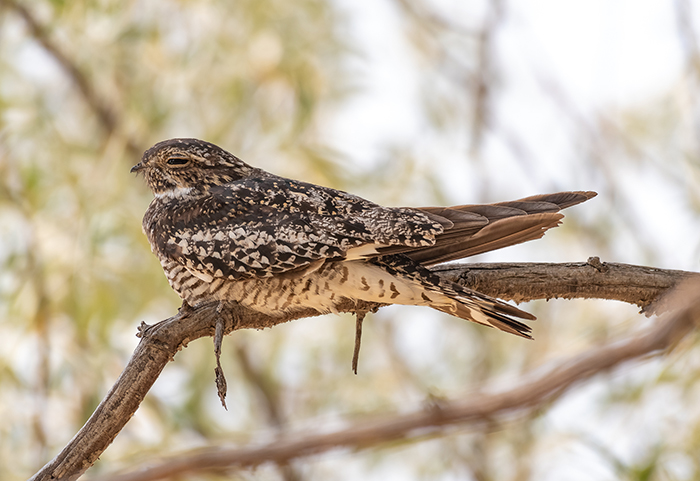
Common Nighthawk, photo: Soo Goh Baus
